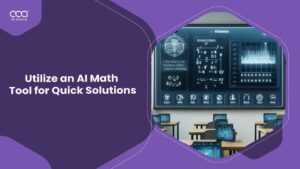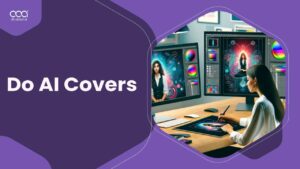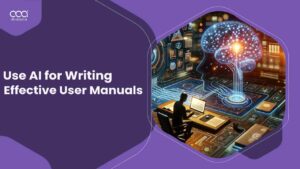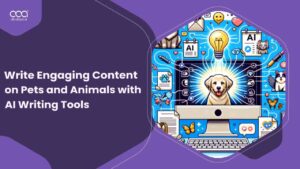Songwriting and production are undergoing a remarkable transformation – all thanks to Artificial Intelligence. Knowing how to write song lyrics using AI in Italy is not just reshaping the landscape of music creation, but it also offers a whole host of advantages for lyricists.
The best AI writing tools are revolutionizing the way lyrics are conceived, offering a fusion of creativity and technology. This article will discuss the significance of AI in lyric writing, exploring its potential to enhance creativity and streamline the songwriting process.
How to Write Song Lyrics Using AI in Italy for 2024? – Step by Step Guide:
AI in lyric writing acts as a dynamic creative partner, offering new perspectives and ideas. By analyzing existing lyrics, it can suggest themes, phrases, and complete verses that align with the songwriter’s style and intent.
For instance, AI tools like ChatGPT and LyricStudio use natural language processing to understand and mimic poetic and lyrical structures, making them valuable for brainstorming and refining song ideas.
If you’re excited by the idea of using AI to enhance your songwriting, don’t miss our detailed exploration in “I made this Pop Song using free AI tools – AI music revolution is nigh“, where we dive into the practical applications of AI in crafting hit songs and innovating the music creation process.
Here’s how to write song lyrics using AI in Italy.
Step 1: Generating Ideas
When you start writing a song, AI can jumpstart your creativity. Input a theme, mood, or a few starting lines into an AI tool like ChatGPT or LyricStudio. The AI then suggests various ideas and concepts based on your input. This is particularly helpful when you’re stuck or looking for fresh perspectives.
Step 2: Crafting Lyrics
Once you have a basic idea, the AI helps craft actual lyrics. It analyzes patterns in successful songs to suggest lines that rhyme, fit your song’s rhythm, and match the overall tone. This step isn’t just about generating random lines; it’s about creating lyrics that resonate with your theme and style.
Step 3: Refining and Personalizing
Just choosing the right AI tools might not be enough, and AI-generated lyrics will not be perfect on the first go. This is where your creativity comes in. Take the AI’s suggestions and tweak them. Change words, play with metaphors, or adjust the structure. The goal is to make the lyrics truly yours, with the AI acting as a creative assistant.

Step 4: Experimenting with Styles
AI tools are versatile. They can adapt to different genres and styles. This means you can experiment with your lyrics. Fancy writing a country song today and a rock anthem tomorrow? AI can switch gears as quickly as you do, providing suitable lyrics for different musical styles.
What Is AI Songwriting?
Artificial intelligence in songwriting makes the most of advanced machine learning algorithms to create lyrics and melodies, transforming the traditional process of song composition. By analyzing vast music databases, it offers innovative approaches to song creation, challenging conventional methods and expanding the artistic horizon.
The introduction of AI in songwriting brings a novel wave of creativity, enabling unique compositions that might be elusive to human creativity alone. This technology not only enhances lyrical and melodic diversity but also pioneers new genres and styles in the ever-evolving music landscape.
Best Practices for Using AI in Song Form Creation
To master how to write song lyrics using AI in Italy, it’s essential to strike a balance between leveraging technology and infusing personal creativity. Employing AI tools effectively can enhance the songwriting process, allowing for a unique blend of algorithmic precision and artistic expression.
Define the Song Structure:
Start by outlining the basic structure of your song. Whether it’s verse-chorus-verse or a more unconventional pattern, having a clear structure helps AI tools provide more relevant suggestions.
Use AI for Inspiration, Not Just Creation:
Let AI suggest ideas and patterns, but use your creative judgment to select and modify these suggestions. AI is a tool to spur creativity, not replace it.

Experiment with Different AI Tools:
Each AI songwriting tool has its unique strengths and specialties. Experimenting with various tools can help you find the one that best suits your creative style.
Provide Detailed Feedback:
The more information and feedback you provide to the AI, the more tailored the suggestions will become. Detailed input on style, mood, and thematic elements can guide the AI to align more closely with your creative vision.
Understand the Limitations of AI:
While AI can offer innovative ideas and structures, it may not always capture the emotional depth or specific artistic intent a human songwriter can. Use AI as a complement to your skills, not a replacement.
Overcoming Writer’s Block:
Writer’s block is a common hurdle in the creative process of any writing process, be it writing blog posts or songwriting. It can stem from various factors like lack of inspiration, self-doubt, or simply being stuck with a particular lyric or melody. This blockage can halt the progress of a song, sometimes for extended periods.
How AI Helps Break Through the Block
AI, with its vast database and learning algorithms, plays a huge part in helping songwriters overcome writer’s block. Here’s how it works:
- Providing Fresh Perspectives: When you’re stuck on a line or can’t find the right words, AI can suggest alternatives. These suggestions are based on a wide array of existing song lyrics and styles, offering new angles and ideas you might not have considered.
- Breaking the Routine: Sometimes, writer’s block arises from being too entrenched in a certain way of thinking or writing. AI disrupts this by offering diverse and unconventional lyric options, breaking the cycle of repetitive thought patterns.
- Prompting Creativity: AI’s suggestions can serve as prompts. Even if you don’t use the exact lines provided by the AI, they can spark new ideas, leading you down creative paths you hadn’t explored before.
- Instant Feedback and Iteration: Unlike traditional co-writing where feedback can take time, AI provides immediate suggestions. This instant feedback loop allows for rapid iteration and experimentation, keeping the creative juices flowing.
- Emotional Detachment: Sometimes, the pressure of creating the ‘perfect’ line leads to writer’s block. AI offers an emotionally detached perspective, providing objective suggestions without the baggage of self-criticism or doubt.
The Importance of AI in Overcoming Writer’s Block for Songwriters
For songwriters, AI is more than just a tool; it’s a collaborative partner that’s always available, never tires, and doesn’t judge. It offers a safety net, ensuring that there’s always a source of inspiration to turn to when the creative well runs dry.
Through the use of AI, songwriters can maintain a consistent creative output, enhance their lyrical quality, and explore new creative territories, ultimately leading to richer and more diverse songwriting.
AI’s Contribution to Melody Creation in Songs
AI’s role in melody creation marks a significant advancement in music composition. Tools like Magenta Studio and Captain Melody employ machine learning algorithms to generate melodies that are not only unique but also harmonically and rhythmically coherent.

These AI tools analyze vast amounts of musical data, understanding patterns and structures in popular and classical music, and then apply this knowledge to create new melodies.
The process of using AI for melody creation typically involves:
- Selecting a Genre or Style: Users can choose a specific genre or style, which the AI uses as a base for creating melodies.
- Inputting Musical Elements: Songwriters can input chords, tempo, and other musical elements. The AI then creates a melody that complements these inputs.
- Customizing the Output: AI-generated melodies can be further customized. Songwriters can tweak notes, rhythms, and phrasings to suit their specific needs.
- Integrating with Other Musical Elements: The generated melodies can be integrated with other song elements like lyrics and chord progressions. This integration often results in a more cohesive and harmonious composition.
AI in melody creation does not just replicate existing music styles; it can potentially create entirely new ones. This aspect of AI introduces an exciting realm of possibilities, where the boundaries of musical creativity are continually expanded.
How AI Assists in Arranging Music
By analyzing extensive music data, AI offers coherent and aesthetically pleasing arrangements, encouraging exploration of unique instrument combinations and structures.
This technology enhances creativity, pushing the boundaries of traditional music arrangement. AI tools like AIVA are revolutionizing music arrangement by suggesting harmonies, instrument layers, and rhythms.
These AI tools provide customization, allowing artists to tweak AI suggestions to match their artistic vision. This collaborative process between AI and human creativity ensures that the final arrangement is not only innovative but also deeply personal, reflecting the artist’s unique style and intent.
Innovative AI Approaches to Creating Vocals in Music
AI vocal tools such as Voicify and Synthesizer V are revolutionizing vocal production, allowing songwriters to generate realistic vocal tracks from text inputs. This innovation is particularly beneficial for learning how to write song lyrics using AI in Italy, as it offers a variety of voices and styles, enabling creators to experiment with new sounds and vocal textures without the need for live vocalists.
These tools offer extensive customization, from changing pitch and tone to altering emotional expression. This flexibility allows artists to experiment with a wide range of vocal styles, from robotic to eerily human-like, catering to diverse musical genres and artistic preferences.
AI’s Influence on Mixing and Mastering Music
AI is reshaping mixing and mastering, exemplified by tools like iZotope’s Ozone and Landr. These platforms automate the process, applying effects like EQ and compression, thus making professional sound quality more accessible. They enhance clarity, balance, and depth, ensuring tracks sound good across various systems.
Automated AI tools not only streamline the technical aspects but also ensure consistency and quality in the final output. This advancement opens up professional-level mixing and mastering to a broader range of artists, democratizing high-quality music production.
AI’s Role in Music Production
In music production, AI acts as both a creative partner and a technical assistant. It handles technical details, allowing artists to focus on creativity, and suggests new musical elements like chord progressions and rhythms. This expansion of creative possibilities is redefining the music production landscape.
As AI evolves, its influence in music production is set to grow, potentially introducing new musical expressions and genres. For artists, leveraging AI means embracing an evolving landscape of music creation, filled with innovative possibilities and new forms of artistic expression.
FAQs
Can you use AI to write a song?
Do musicians use AI?
Will AI replace songwriters?
Are AI-generated songs copyrighted?
Conclusion
The current state of AI in music showcases a harmonious mix of technology and creativity, providing new opportunities for artists and producers. We encourage readers to delve into the possibilities of AI in music, particularly on how to write song lyrics using AI in Italy, as a way to enhance their musical explorations.
Knowing how to write song lyrics is truly a game changer for musical artists of all genres. However, songwriting isn’t the only thing AI can help with. To learn more about how to use AI for various other tasks, check out the articles we have in our How To series. If you’re just looking to expand your overall AI knowledge, our AI Glossary has all you need and more!





